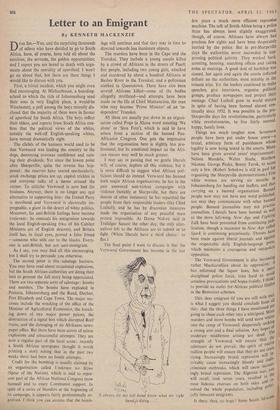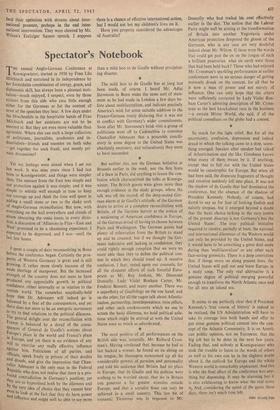Letter to an Emigrant
By KENNETH MACKENZIE DEAR S1R,—You, and the surprising thousands of others who have decided to go to South Africa, have, of course, been told all about the sunshine, the servants, the golden opportunities; and I expect you are bored to death with argu- ments about the morality of apartheid. I won't go on about that, but there are three things I would like to discuss with you.
First, a trivial incident, which you might even find encouraging. At Michaelhouse, a boarding- school to which the rich of Johannesburg send their sons (a very English place, a would-be Winchester), a poll among the boys recently dis- closed that the majority of them were in favour of apartheid for South Africa. The boys reflect their elders, and reports from South Africa con- firm that the political views of the whites, notably the well-off English-speaking whites, have moved dramatically right.
The cliches of the business world used to be that Verwoerd was leading the country to the dogs, destroying overseas confidence and ruin- ing their dividends. Yet since the lowest point after Sharpeville, quite the reverse has hap- pened: the reserves have soared spectacularly, stock exchange prices are up, capital trickles in and everyone talks of a boom around the corner. To criticise Verwoerd is now bad for business. Anyway, there is no longer any real alternative to supporting him: the United Party is moribund and Verwoerd is electorally im- pregnable, a giant in the desert of white politics. Moreover, his anti-British feelings have become irrelevant: he conceals his antagonism towards the local English-speaking (two of his Cabinet Ministers are of English descent), and Britain itself has, in local eyes, proved a false friend —someone who sells out to the blacks. Every- one is anti-British, but not anti-immigrant.
As I say, you may find all this encouraging, but I shall try to persuade you otherwise.
The second point is this sabotage business. You may have read about occasional explosions, but the South African authorities are doing their best to prevent the full story being appreciated. There are two separate sorts of sabotage: bombs and murders. The bombs have exploded in Pretoria, Johannesburg and the Rand, Durban, Port Elizabeth and Cape Town. The major suc- cesses include the wrecking of the office of the Minister of Agricultural Economics, the knock- ing down of two major power pylons, the destruction of a signal box which disrupted Reef trains, and the damaging of an Afrikaans news- paper office. But there have been scores of minor explosions and unsuccessful attempts. They are now a regular part of the local scene: recently a South African newspaper thought it worth printing a story noting that in the past two weeks there had been no bomb attempts.
Credit for the bombing is usually claimed by an organisation called Untkonto we Sizwe (Spear of the Nation), which is said to repre- sent part of the African National Congress (now banned) and to enjoy Communist support. In spite of a series of blunders at the beginning of its campaign, it appears fairly professionally or- ganised. I think you can assume that the bomb- ings will continue and that they may in time be directed towards less inanimate objects.
The murders have been in the Cape and the Transkei. They include a young couple killed by a crowd of Africans in the streets of Paarl; five people, including two young girls, attacked and murdered by about a hundred Africans at Bashee River in the Transkei; and a policeman stabbed in Queenstown. There have also been several Africans killed—some of the bodies allegedly mutilated—and attempts have been made on the life of Chief Mantanzima, the man who may become 'Prime Minister' of an 'in- dependent' Transkei.
All these are usually put down to an organi- sation called Poqo (a Xhosa word meaning 'We alone' or `Sinn Fein'), which is said to have arisen from a section of the banned Pan- Africanist Congress. One gets the impression that the organisation here is slightly Tess pro- fessional, but its emotional impact on the Afri- can masses may well be much greater, I may say in passing that we gentle liberals will, of course, deplore all this violence, but it is more difficult to suggest what African poli- ticians should do instead. Verwoerd has banned both major African organisations; he has in the past answered non-violent campaigns with violence (notably at Sharpeville, but there are dozens of other instances); he has separated the people from their responsible leaders (like Chief Luthuli); and he has by draconian measures made the organisation of any peaceful mass protest impossible. As Duma Nok we said in Trafalgar Square the other day, the only alter- natives left to the Africans are to submit or to fight. (White liberals have a third choice: to flee.) The final point I want to discuss is that the Verwoerd Government has become in the last 'I always let my left hand. know what my right hand is doing. . few years a much more efficient repressive machine. The talk of South Africa being a police State has always been slightly exaggerated, though, of course, Africans have always had precious few rights and have been desperately harried by the police. But in pre-Sharpeville days the authorities never succeeded in sup- pressing political activity They worked hard, arresting, banning, searching offices and taking notes at meetings. A good deal of hardship was caused, but again and again the courts inflicted defeats on the authorities, most notably in the treason trial. Yet the leaders continued to make speeches, give interviews, organise political groups, produce newspapers and project their message. Chief Luthuli grew to world stature in spite of having been banned almost con- tinually since 1952. It was possible in the pre Sharpeville days for revolutionaries, particularlY white revolutionaries, to live fairly normal, happy, family lives. Things are much tougher now. Seventeen people have been put under house arrest—a brutal, arbitrary form of punishment whose legality is now being tested in the courts. Many have been given several years' imprisonment: Nelson Mandela, Walter Sisulu, Matthew Nkoana, George, Peake, Benny Turok, to name only a few. (Robert Sobukwe is still in gaol for organising the Sharpeville demonstrations.) Five white women are serving six months la Johannesburg for handing out leaflets, and thus carrying on a banned organisation. Banned people now may not have any word published, nor may they communicate with other banned people. Banned journalists may not Praet15,e, journalism. Liberals have been banned as vrell as the more left-wing. New Age and Fighting Talk have been prevented from continuing pub- lication, though a successor to New Age called Spark is continuing precariously. Threats have been made against liberal journals and against the respectable daily English-language Press' which maintains a courageous and outspoken opposition. The Verwoerd Government is also becomil rather Machiavellian about its oppression: 1 has reformed the liquor laws, has a onr.oe disciplined police force, tries hard to senseless provocations and hopes (vainly, 1 thirliq to provide an outlet for-African political libidos in the Bantustan schemes.
This, dear emigrant (if you are still with is what I suggest you should conclude from this: that the three things I have mentioned at': Mors going to chase each other into a whirlpool. murders and more bombs will send more white into the camp of Verwoerd, desperately seekin, a strong arm and a final solution. Any hopes e moderate middlemen arising are dead. Th strength of Verwoerd will ensure that tile „„1'e saboteurs do not prevail; the spirit of L „—:e million people will ensure that they do not ee5.0.. trying. Increasingly brutal repression will 1. evitably cause increasingly bloody and 5, criminate outbreaks, which will cause i1iCre9_,, ingly brutal repression. The Algerian war, 34-'1; will recall, took seven years, resulted in t most hideous excesses on both sides and Ijti- volved the whole population, including P cally innocent emigrants. cans Is there, then, no hope? Some South Afri feed their optimism with dreams about inter- national pressure, perhaps in the end inter- national intervention. They were cheered by Mr. Wilson's Trafalgar Square speech. I suppose there is a chance of effective international action, but I would not bet my children's lives on it. Have you properly considered the advantages of Australia?



































 Previous page
Previous page